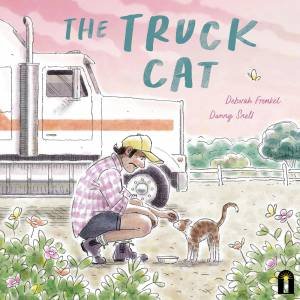This 32-page picture book features Yacoub, a truck driver, and his cat and companion Tinka. Together, they transport goods to locations around Australia.
Yacoub has a handlebar moustache, stubble, and wears a yellow baseball cap. Tinka is an energetic, intelligent tabby, attuned to Yacoub’s thoughts. The pair have a beautiful connection with each other.
From early in the 3rd person narrative, it is obvious that Yacoub is not Australian born and bred. On his travels, he learns ‘the strange new landscape’, and his encounters with other people are difficult because they don’t always understand him. He, like so many Australians, has memories of his (unspecified) home country: music, food and family. One senses that, were it not for Tinka, Yacoub’s life on the road would be very solitary.
Halfway through the book, misfortune strikes when Tinka chases after a butterfly, leaving Yacoub and the truck behind. The tabby is taken in by a kind-hearted baker named Mari. Yacoub eventually reunites with Tinka and finds love with Mari, who bakes pastries like his grandmother used to.
The language in ‘The Truck Cat’ is deceptively simple, with a sprinkling of complex words, such as ‘interlopers’ and ‘mewling.’ A variety of literary devices add richness, including metaphor, onomatopoeia and alliteration, such as ‘pigeons pecked in the petunias.’ The placing of words on some pages reinforces the message conveyed in the story.
The cartoon-style artwork – a combination of vignettes, single page illustrations and double spreads – is fresh and whimsical. It has that magical quality of bringing the text to life while adding an additional layer of story, particularly in the final pages. And like the text, there is depth behind the simplicity. The main characters are imbued with warmth and expression and demonstrate small gestures that strengthen their connection. Rapid movement in graphic novel-style panels contrasts with traffic crawling across a double spread. And the vastness of the Australian landscape reinforces the theme of solitude.
‘The Truck Cat’ introduces readers to some big topics that merit discussion. These include immigration, cultural identity, loneliness, otherness, societal attitudes, companionship, understanding, home and belonging.

